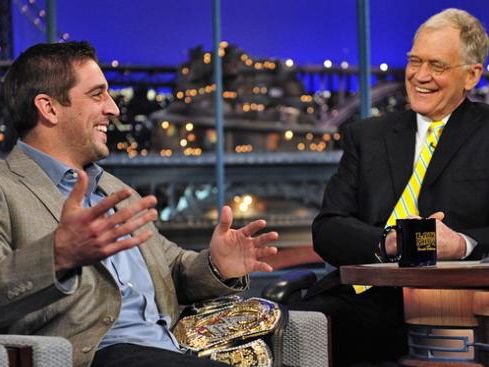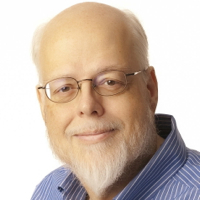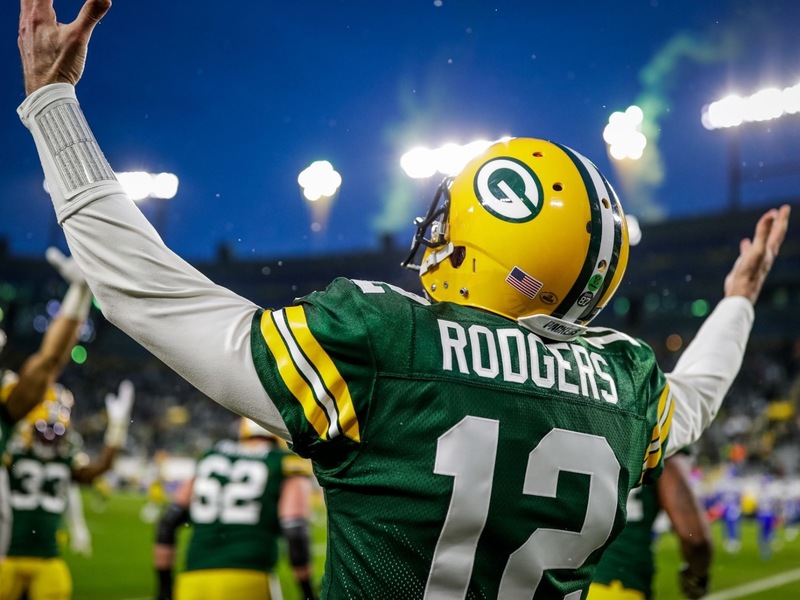CBS released this transcript of Aaron Rodgers' chat with David Letterman:
AARON RODGERS ON "LATE SHOW with DAVID LETTERMAN," MONDAY, FEB. 7
(Rodgers walks out onstage as CBS Orchestra plays "We Are the Champions," and audience gives him a standing ovation)
Dave: "We were talking a little bit about your itinerary for today. Under any circumstances, it would be grueling, but especially after winning the Super Bowl, MVP, and all of the traveling, thank you, thank you very much for the trouble." (audience applauds)
Aaron: "No, this is fun for me. I mean, this is -- I watch your show a lot."
Dave: "I appreciate that."
Aaron: "No, it's good to be here. There must be a lot of Wisconsin people out there." (Wild applause from audience)
Dave: "You know, it seems like most years, in a good year, you get a pretty good story out of the Super Bowl. And this year, to me, is certainly no exception. They have the drama with the previous Green Bay quarterback and they have your ascending to the throne of all of football, but your high school experience -- tell me about your high school experience and then where did that take you?"
Aaron: "Yeah, I was not really recruited out of high school, ended up playing baseball my senior year and thought about doing baseball, thought about joining the military but I decided to go the junior college route, which not a lot of kids go to who actually have good grades. Um, I had pretty good grades in high school." (Audience laughs) But that was a great opportunity to advance my career."
Dave: "Now why weren't you recruited out of high school for a college, a major college?"
Aaron: "I think a number of reasons: one, I wasn't, you know -- even today, I'm not gonna be the guy who pops out as -- you know, I'm not 6'5", I'm not 240, I'm don't run a 4-5-40. But I think a lot of times, the things you can't measure are often the things that give people the most success." (Audience applauds)
Dave: "How big were you in high school your senior year?"
Aaron: "I was like 6'2", 190."
Dave: "Really? So, you could have been, I mean, statistically, that would have – well, 190's a little light for a quarterback, right? What do you weigh now?" (Aaron, audience laugh)
Aaron: "Uh, 230."
Dave: "230? Wow, that's pretty good." (Audience laughs) "You know what I'm thinking in high school might have been the problem? Were you giving 100 percent?" (audience laughs)
Aaron: (laughs) "No."
Dave: "Were you giving 110 percent?"
Aaron (laughs): "No."
Dave: So then you go to play, what is the team you played for in junior college?"
Aaron: "I went to Butte Community College."
Dave: "Butte Community College in Montana? No!" (Rodgers, audience laugh) "Where's Butte Community College?"
Aaron: "It's actually in a town called Oroville, which is about 30 minutes from my hometown, Chico, in northern California."
Dave: "Now, what kind of team? Who were your teammates?"
Aaron: "We had a great team. We had, I think, 13 guys go Division I off of that team, we went 10-and-1, lost, you know, one game – we put up 42 points, and finished second in the country in the junior college rankings. And I actually lucked into my opportunity. Cal was looking at our tight end, Garrett Cross, who was a great player. Jeff Tedrick actually came up to watch him work out, he liked my work out and he ended up offering me -- you know, as he drove home, he called me and offered me a scholarship?
Dave: "That's fantastic, isn't it? And what did you learn besides, you know, never give up, which is important in all walks of life. What else did you learn about managing a team? Because you were 18 playing with guys who had been in prison, guys who had -- I mean, I'm right about that, aren't I?"
Aaron: "That's true."
Dave: "So you were running a club, some guys older than you, some guys, certainly more experience."
Aaron: "I think leading by example was the most important lesson I learned. It's hard to be able to have the words to relate to a guy like that, who's been through prison, who's been in the workforce, been in the military." (audience laughs)
Dave: (Laughs) "I don't know why this is funny." (Audience laughs)
Aaron: (Laughs) "I'll stop right there."
Dave: "Yeah, okay. Now, Brett Favre, his coming and going – when he came to New York City, and he retired. I can remember Brett Favre sitting right here, and I said, 'So I understand you've retired,' and it was in all -- everywhere. And he says, "Well, maybe I have, maybe I haven't,' and it turned out he had not retire. Now, was this, for you, his backup, did this become a distraction as you were taking his place on the team?"
Aaron: "I don't think it was a distraction. I think -- you know, I was the guy who took all the reps in the off season, and he was the guy who took all the reps during the season, so. That's kind of how it worked out."
Dave: "So there's a certain justice in this then isn't there? I think so." (audience applauds) "Is it nearly -- I mean, there's only a handful of men who do this, and some women -- " (audience laughs) " -- but is it impossibly hard to be an NFL quarterback?"
Aaron: 'I don't -- I don't know how to answer that. If I say I don't think so, it makes me sound arrogant. You know what, it's something that you've really got to put the time into. I feel like I've been successful because I've not only been surrounded by great people, but I care about my job and I care about being successful."
Dave: "What is your greatest asset, when you get out there, in a Super Bowl, in an exhibition game, what is your greatest asset?"
Aaron: "I think my confidence, which comes directly from my preparation. I put the time in, I watch film, I study our game plan, I practice hard, so I go into the game and I expect to play well."
Dave: "And your first season as Green Bay quarterback, your record was like 6-and-10, was that what it was? Now, what is that like? Is that like, 'Oh, geez, maybe I can't do the job?' Do you ever get any of that with your confidence?"
Aaron: "You know what? Thankfully, I was surrounded by a group of guys who really believe in me and supported me even through that, the fan base was great." (Audience applauds) "But, yeah, I mean, you go through stages where you start to lose some confidence, you wonder if you can really get it done, but the biggest change I think in my development was at off-season, when I said, 'You know what? I want to the best in my position, so I need to make sure that I take the steps this off season to put myself in a position to be successful."
Dave: "How many different plays did you run yesterday, different plays?
Aaron: "Mike likes to repeats some calls sometimes, especially if they work, but..." (Audience laughs)
Dave: (Laughs) "Well, there's your coaching key right there."
Aaron: "'Not this one again.'" (Dave, audience laugh)
Dave: "What are we talking about, 20, 25?"
Aaron: "We only had about 60 plays I think in the game, so we probably ran 40 different plays?"
Dave: "Now, at this stage of the game, you don't get guys coming into the huddle saying, 'Uh, is that where I go left, or is Larry going left?' At this point, you don't get that, do you?"
Aaron: "No, you actually do." (Dave, audience laugh)
Dave: "Now, you talk about all the guys you've benefited from as teammates, Charles Woodson, at halftime he's got a busted collarbone for God's sakes. Now here's a guy, a key to the defense, what goes on at halftime yesterday?"
Aaron: "That was tough. I mean, one, it's a 28 minute halftime compared to a usual 12 minute, so you have to find ways to keep yourself busy there. But Charles was beside himself. I mean, you know, he's pretty cut up emotionally and, you know, they're saying, 'Hey, go talk to Charles.' I'm like, what do I say to Charles? He's out for the game, he's our emotional leader, he's our guy that talks before every game. So I just went over to him and said, 'Hey, man, I'm sorry you can't finish it, but I'll see you on the field afterwards to celebrate.'" (Audience applauds) "You know, all week, he talked about the one thing that he wanted to do was celebrate with his little son, Charles, in the, you know, in the confetti there."
Dave: "This was his second Super Bowl, first with the Packers ... Now is it possible for a guy to be a team leader who is not the quarterback? Or does that just come with the job, you've got to be the leader.
Aaron: "I do have to be one of the leaders, but it takes multiple leaders to have a locker room that functions properly. Thankfully, a guy like Charles, he comes in with his reputation, with his experience and with the way he plays, he's got instant credibility with the guys. He's really taken more of a speaking role this year in the locker room, and me, I'm more of a leader by example."
* * *
Letterman then brought out the WWE championship belt, which Rodgers wore when he accepted the Super Bowl MVP trophy.
* * *
Dave: "It looked early on like it was going to be an easy victory for the Packers, and then things got a little tense toward the end and the final drive, and we've seen this before from Ben Roethlisberger, that must have been a little tough to watch, huh?"
Aaron: "No, it was. You know, I told the guys in the huddle when there were seven minutes left, 'You know, we take this down, we get a touchdown, the game's over, we're champs. And we put together a good drive. You know, I had a couple passes, Jordy made a big catch and run, I hit a pass to James on the sidelines, you know, on third down, just missed Jordy to really close the game out, kicked a field goal and I'm thinking, one, I'm a little worried about our special teams. Every time we kick off, I kind of hold my breath."
Dave: "Now, why is that? Because earlier you spoke of nothing but confidence in the team?" (Dave, Aaron, audience laugh)
Aaron: "It's just too many bad memories of us taking control of the momentum and then losing it with a kickoff return or, you know -- and it just seemed to happen at times. But we lucked out. One of their guys punched one of our guys, got a 15-yard penalty -- you can't do that." (Aaron, audience laugh)
Dave: ""No, you hate to see that."
Aaron: "It's tough, you know?"
Dave: "Is it fun when you're out there? I mean, you're overwhelmed by adrenaline for a while aren't you when you're out there?"
Aaron: "Yeah, I was pretty hyped up starting the game. I'm usually pretty calm throughout the game, but I was a little hyped up, missed a couple throws early on, but once we settled into the game, you know, it just felt like another game and was able to go through my progressions and make some plays.
Dave; "What is the belt we have here? Tell us the origins of this."
Aaron: "You know, the belt's really caught on."
Dave: "Go ahead and spin it, you're dying to spin it." (referring to the WWE emblem on the middle of the belt; laughs as Aaron spins it)
Aaron: "It's just a celebration that started in practice, really, and the fans love it, so we've gotta give them what they love." (fans in audience cheer) "It's usually just after, you know, like a run or something, 'cause I usually surprise myself on those."
Dave: "Well, now you got one there for real, my friend. Now, do you mind just throwing me something simple? Don't hurt me. I'll be over here, don't hurt me, all right?"
(Dave goes to aisle in theater by the audience and drops back to catch a pass from Aaron.)
Tim Cuprisin is the media columnist for OnMilwaukee.com. He's been a journalist for 30 years, starting in 1979 as a police reporter at the old City News Bureau of Chicago, a legendary wire service that's the reputed source of the journalistic maxim "if your mother says she loves you, check it out." He spent a couple years in the mean streets of his native Chicago, and then moved on to the Green Bay Press-Gazette and USA Today, before coming to the Milwaukee Journal in 1986.
A general assignment reporter, Cuprisin traveled Eastern Europe on several projects, starting with a look at Poland after five years of martial law, and a tour of six countries in the region after the Berlin Wall opened and Communism fell. He spent six weeks traversing the lands of the former Yugoslavia in 1994, linking Milwaukee Serbs, Croats and Bosnians with their war-torn homeland.
In the fall of 1994, a lifetime of serious television viewing earned him a daily column in the Milwaukee Journal (and, later the Journal Sentinel) focusing on TV and radio. For 15 years, he has chronicled the changes rocking broadcasting, both nationally and in Milwaukee, an effort he continues at OnMilwaukee.com.
When he's not watching TV, Cuprisin enjoys tending to his vegetable garden in the backyard of his home in Whitefish Bay, cooking and traveling.







